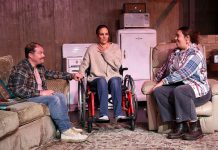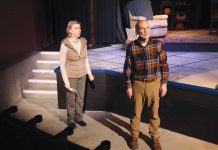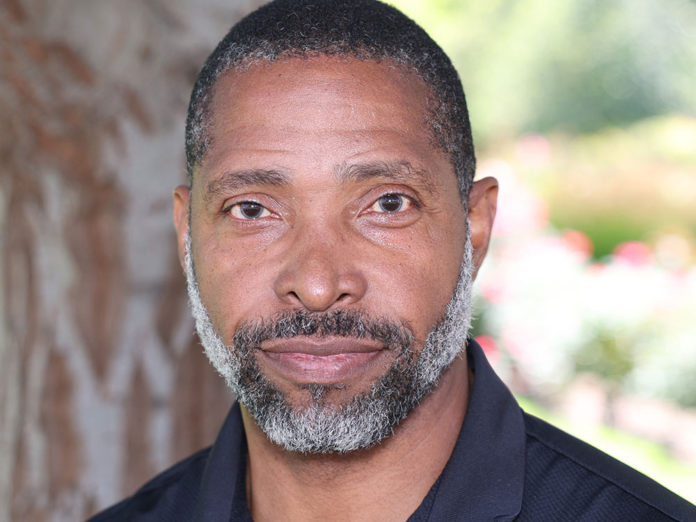
Although the Raven Players have presented quality community theater for over 20 years, for the past four years there’s been a new stage in town: The 222. Located inside the Paul Mahder Gallery on Healdsburg Avenue, the risers and lights are used for many other kinds of performance art at The 222. This year nine shows will be presented on the stage—six plays and three one-person shows. We spoke with Aldo Billingslea, the producer of the Theater series at The 222 since it started in 2021, to learn about the challenges and advantages of theater in Healdsburg.
Billingslea is a professor of Acting and Performance Studies in the Department of Theatre and Dance at Santa Clara University since 2005. Now 60, he first caught the acting bug as a seventh grade student in Fort Worth, Texas, where he grew up.
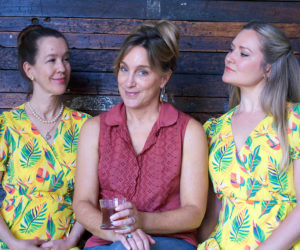
Billingslea: I got into theater because I saw a production of Oklahoma! where the high school students that I was watching were actually kissing on stage. And the excitement of being in the same space where those people were kissing and where those high school students were hooting and hollering was electric. It made my heart jump. And being a guy who at that point had not been kissed, I immediately auditioned for the next play. It took me about eight years before I got my first stage kiss, and it was on the cheek, but by that time I was addicted to the art.
The thing that got my heart pumping was this feeling that, as one of my colleagues said, as soon as the curtain opens, you’ll feel this energy that comes from the audience. And it’s the best thing ever. And that is a reciprocal energy that goes back and forth, and we feed each other that way. So it’s how you build an instant community, and it is a life-changing experience that unfortunately is going to be denied to more and more people unless we turn this around.
Healdsburg Tribune: What do you mean – are the theater arts in danger?
There was recently a thread on social media, a national call to find out how many other areas in the country are struggling as much as the Bay Area is in the arts. And though there are some struggles in other places, and there are some other theaters that are closing, this is really the epicenter of a nuclear winter that’s happening in the world of theater. At The 222, our productions only last two weekends. Most of the time when you are an actor and you do a gig, it is about a four-week run. We were discussing with other program directors at The 222 whether we could sustain a three-week run. The benefit of a longer run is word-of-mouth, that as people leave and really have a great experience, they tell other people, and more people want to come. By the time your show closes there’s a vast difference from what that opening night audience might have seen.
We don’t want to get out over our skis on this. But you still want to be cautious and conservative in your approach because of the economics of theater, which is why so many of our sister theaters in the Bay Area close over recent years’ lack of funding and support.
Is live theater that expensive to produce?
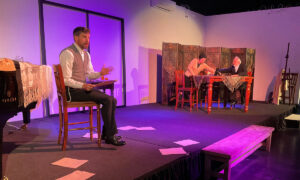
Absolutely. The Actors Equity Association, or AEA as it’s often abbreviated, means actors and others who are in the union have the benefit of having a union standard, a union-set wage. And that helps keep us who love the work so much that we would almost do it for free, from having to always negotiate tooth and nail so that we can continue doing the art—but also live in one of the most expensive regions in the world.
There’s a reason that professional theater around the country is in the nonprofit realm: It is an extraordinarily expensive endeavor because it involves people. In any business enterprise one of your most expensive items on your budget is going to be the human beings. Theater is a collaborative art form that requires designers and technicians and performers and playwrights. Everywhere you turn there’s another person, another human being that is working to collaborate, to create the art.
How did you get connected with Paul Mahder and The 222?
Paul and I were both members of the same church, St. Gregory’s Episcopal in San Francisco. My wife is a visual artist named Renee Billingslea. She and Paul really hit it off, and she had work in Paul’s galleries when they were in the Mission. When he moved the gallery to Healdsburg, I think possibly even before it opened, he talked to me about producing theater. I kept saying, “No, it’s a lot of work, it’s daunting, I don’t think I’m the person for it.” But he was committed to the idea from the start. Around the time that he’d been there almost 10 years he still was asking so I said, “Yes.”
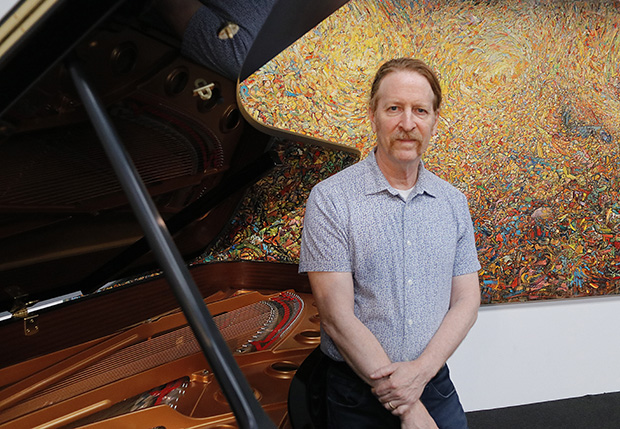
Fortunately Paul has cultivated a group of people who appreciate that and have been generous enough to help support us, many people who’ve been able to open their homes to the performers so that we can house the artist when they come in—they rehearse elsewhere, but then they come to Healdsburg to perform.
Because of Paul Mahder, because of this person who has this vision and is dedicated to seeing professional live theater in Healdsburg, we’ve been able to exist and expand. We started with one play in the first season (Chapati, 2022), and in our fourth we are now producing six plays, plus three one-person shows for Healdsburg audiences.
The season’s first play, Laundry and Bourbon (by James McLure), opens this weekend. What can the audience expect?
They can expect to laugh, and they can expect high-quality acting. We’ve got three terrific actors who are portraying the life of some women in Texas whose men they talk about, but who we don’t see on stage. These women live in a realm where they are somewhat confined by societal expectations. And when they are alone, they can sometimes break out of those expectations a bit. There’s some secrets that get revealed. There are some longings that get acknowledged. And then there are some longstanding rivalries about people who are on the lower echelons of society who are trying to rise in their own way.
The Raven Players have been in town for almost 20 years. How do you feel about their programs?
We are benefiting from the work of other artists that have been in the community, in particular Steven David Martin from Raven Players. He’s been able to cultivate and nurture the desire in the community for challenging theater. I actually have seen a couple of plays that the Raven Players did, including If I Don’t Make It I Love You. I thought it was remarkable that they even worked to produce a play about school shootings. But also the way that it was done, the execution and the acting—that showcased some of the talent that they have there, and their willingness to go after tough subjects.
That’s the sort of thing that makes it possible for somebody else to come in and say, “Let’s try to run this race together.”
‘Laundry and Bourbon’ is performed Sept. 5-7 and Sept. 12-14. For times and tickets, go to the222.org.


